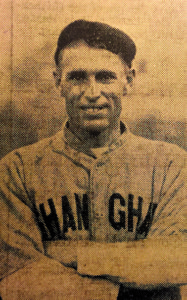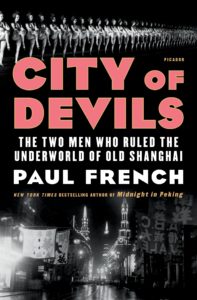by Paul French
Shanghai, 1930s: It was a haven for outlaws from all over the world; a place where pasts could be forgotten, fascism and communism outrun, names invented, and fortunes made—and lost.
From Paul French, the New York Times bestselling author of Midnight in Peking—winner of both the Edgar Award for Best Fact Crime and the CWA Gold Dagger for Non-Fiction—comes City of Devils, a rags-to-riches tale of two self-made men set against a backdrop of crime and vice in the sprawling badlands of Shanghai.
“Lucky” Jack Riley was the most notorious of those outlaws. An ex-U.S. Navy boxing champion, he escaped from prison and rose to become the Slots King of Shanghai. “Dapper” Joe Farren—a Jewish boy who fled Vienna’s ghetto—ruled the nightclubs. His chorus lines rivaled Ziegfeld’s.
In 1940, Lucky Jack and Dapper Joe bestrode the Shanghai Badlands like kings, while all around the Solitary Island was poverty, starvation, and war. They thought they ruled Shanghai, but the city had other ideas. This is the story of their rise to power, their downfall, and the trail of destruction left in their wake. Shanghai was their playground for a flickering few years, a city where for a fleeting moment even the wildest dreams could come true. Keep reading for an excerpt of City of Devils.
* * * * *
A big weekend, the Double Fifth—fifth day of the fifth month. Shanghai’s 1932 celebration of Chu Yuan, the Dragon Boat Festival, is in full swing. And Jack’s got something to celebrate: he has turned the Manhattan into the top bar on Blood Alley.
It’s more a strip than an alley, really; 110 yards max. Two dozen bars, maybe more, mostly holes in the wall; plenty haven’t even got electricity and you don’t want to think about the latrines out back. Punters wander from one to another, crawl from one counter to the next. Stick to the hooch, however bad it’s watered down, because the local water’s got cholera and amoebic dysentery. Each bar stinks of sweaty linen, hair oil, pomade, brilliantine, cigarette smoke, rotten breath, cheap working-girl perfume. Mix that with the petrol stink from the paraffin vapor stoves and kerosene lamps, and there’s a hell of a funk. These dive bars aren’t afraid to give themselves some grand names, though—the Palais Cabaret, the ’Frisco, Mumms, the Crystal, George’s Bar, Pop’s Place, Monk’s Brass Rail, the New Ritz… and, of course, the Manhattan. The working girls are a League of Nations—Cantonese from the south, unfussy fat Koreans, French-speaking Annamite girls with wide hips, and really skinny, gorgeous ‘Natashas’, the collective Shanghailander noun for White Russian women of dubious occupation. The latter are double the price of any other girl, except the Americans tucked away in the higher-end bordellos on Kiangse Road and away from the groping paws of the soldiers and Navy boys. They all work the bars alongside dead-eyed Eurasian Macanese and hardworking Filipinas and Formosans. The dim lights of Blood Alley disguise the track marks and pox scars.

Jack is straight in for the army crowd—Fourth Marines, Seaforth Highlanders, Welsh Fusiliers, Savoia Grenadiers, and French matelots, along with the men of the Liverpool tramps of the Blue Funnel Line. They love him and his hooch. Jack lays out plates of ham sandwiches and bowls of watery slumgullion stew, gratis, for the boys to keep them drinking. Men with empty bellies don’t booze hard, they just fall over early and get picked up by the shore patrol. A marine private is pulling in thirty bucks a month, a gunnery sergeant maybe eighty bucks, and Jack is selling beer at two cents, a bottle of top-shelf London gin for sixty-seven cents, and a bottle of legit Johnnie Walker for under a dollar. Meanwhile back home they’ve got the Great Depression and Prohibition. The Alley’s a slum, but these schmucks think they got lucky winding up on it.
Jack’s got a small combo playing on the tiny stage—Manilamen with a wailing sax and blasting trumpet. The Manhattan and Pop’s Place are the two best joints to hit on Blood Alley, but if you’re smart and sober, you keep your hands on your wallet at all times. Jack’s barman and bouncer is Mickey O’Brien, his old pal from the door over at the Venus Café. Mickey is Jack’s equal in the muscleman stakes and keen on the work too. Babe, also from the Venus, is his main girl. When she’s not off on the end of the pipe, she sits in the window and pulls in plenty of randy marines and High- landers. Jack buys her white linen dresses from Madame Greenhouse’s on the Bubbling Well Road to keep her looking good. He tells her to quit the smoke, it gives her a runny nose and glassy eyes, but she just smiles and avoids his glare.
There’s a hierarchy to Shanghai bar streets. Bottom of the heap is Jukong Alley up north of the Soochow Creek—‘Varicose Alley’, Jack jokes—with bathtub gin that’ll blind you. That year Aimee Semple McPherson and her band of holy rollers hit ‘the wickedest city in the world’ and started patrolling Jukong Alley looking to save souls and baptize the working girls. Jack makes a donation to keep the Bible-thumpers out of Frenchtown. To everyone’s surprise, McPherson does actually baptize and save the souls of eight working girls and one poor punter before she sails back to America. But too many drunk squaddies are getting rolled for their pay, so Jukong gets declared out of bounds by order of the British Army Red Caps and the American Miltary Police. Also to the north of the Settlement is Scott Road, which has been called ‘the Trenches’ since the 1890s and isn’t much better. It too is out of bounds for any man in a uniform. Consequently Blood Alley, marginally a step up from Jukong and the Trenches, gets the soldier and sailor traffic.
 Jack branches out. He invests his Blood Alley profits and opens Riley’s Bamboo Hut up on the North Szechuen Road, not too far from the Venus—kind of a luau theme mixed with rattan furniture round the bamboo-lined walls, waitresses wearing Honolulu leis and not much else. North Szechuen in Hongkew is marginally classier than Blood Alley, though far from top drawer. Jack taps Nellie to get in some dancers who didn’t quite make the cut for the Follies; Joe finds him a band looking for a gig who can work up a few ukelele tunes to fit the theme. Hongkew is mostly out of bounds to squaddies and leathernecks, but not to officers. And so Jack covers the bases—the Manhattan coins it in from the leathernecks and the ranks; the Bamboo Hut gets the NCOs and the brass.
Jack branches out. He invests his Blood Alley profits and opens Riley’s Bamboo Hut up on the North Szechuen Road, not too far from the Venus—kind of a luau theme mixed with rattan furniture round the bamboo-lined walls, waitresses wearing Honolulu leis and not much else. North Szechuen in Hongkew is marginally classier than Blood Alley, though far from top drawer. Jack taps Nellie to get in some dancers who didn’t quite make the cut for the Follies; Joe finds him a band looking for a gig who can work up a few ukelele tunes to fit the theme. Hongkew is mostly out of bounds to squaddies and leathernecks, but not to officers. And so Jack covers the bases—the Manhattan coins it in from the leathernecks and the ranks; the Bamboo Hut gets the NCOs and the brass.
The money is rolling, and Jack is building a stash as 1932 rolls into 1933. But he’s still trying to wipe out his past. He takes a steamer to Yokohama. Some all-American dollars get Jack T. Riley a Chilean passport from the consul general before he’s inevitably recalled after, equally inevitably, another military coup in Santiago. Jack stays and relaxes in the Grand Hotel, wastes a few nights in the famous Nectarine bordello, gets bored and jumps a steamer back to Shanghai. At dockside he tells customs he’s Jack T. Riley, bar proprietor in Shanghai and proud to be a Chilean citizen.
He is waved through with a low bow and a smartish salute. Tonight he’s out back of the Manhattan decanting cheap apple cider into champagne bottles. He’d have gone for apple juice at half the price, but it needs a little fizz when it comes out of the bottle to look real. Still, apple cider knocked out at champagne prices is a good margin for the Manhattan. Later on, he’ll baptize the whisky with a little holy Shanghai water to boost his margins a touch more. He can’t stop thinking of those lines of slots pouring coin into buckets back in Manila, with that lanky Canadian collecting the dough. There aren’t any slots in Shanghai, just illicit high-end roulette for the swells, which keeps on getting busted by the Shanghai Municipal Police, and the Hwa-Wei Chinese lottery for everyone else. Business has been booming in Manila, with the rackets down there running booze across the Pacific into Prohibition- dry San Francisco and bringing back three-reel ‘Liberty Bell’ slot machines in parts in the empty whisky barrels. Jack wires Joe, who’s on tour down in Manila with Nellie and their Follies. Maybe Joe can look into it? Joe wires back, sure thing, finds a supplier; Jack orders his first shipment, wires the guy the money, and they arrange delivery. Shanghai is about to welcome the reign of the Slots King.
PAUL FRENCH was born in London, educated there and in Glasgow, and has lived and worked in Shanghai for many years. His book Midnight in Peking was a New York Times Bestseller, a BBC Radio 4 Book of the Week, and will be made into an international mini-series by Kudos Film and Television, the UK creators of Broadchurch and Life on Mars.
